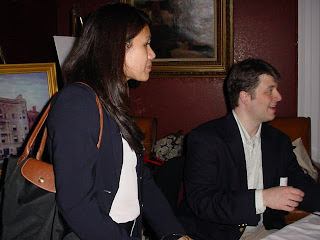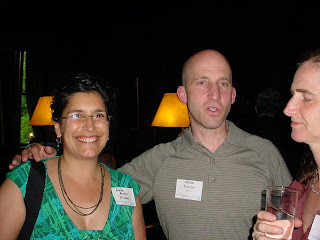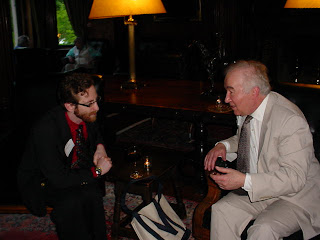
Dean Awn spoke on Unraveling the Arab Spring:
Arab Spring, Shi`ah vs. Sunni, Democracy vs. Shari`ah—how do these simplistic descriptors keep us from grappling with the complexity of what is actually happening in Egypt, Syria, Iran and other parts of the Middle East? How does religion figure into the debates about social and political change?


Dean Peter Awn, Columbia University
Peter Awn is Professor of Islamic Religion and Comparative Religion at Columbia University, Dean of the School of General Studies, and director of the Middle East Institute. Dean Awn has lectured widely to academic and business professionals on the role Islamic religion plays in the current political and social development of the Muslim world. Dean Awn has received many awards and accolades for his dynamic lectures and teaching, including the Great Teacher Award from the Society of Columbia Graduates. Dean Awn earned his PhD in Islamic religion and comparative religion from Harvard University in 1978, and holds a BA in Philosophy and Classical Languages from Fordham, and an M.Div. in Christian Theology from Woodstock College.

Michaela Shank of the Alumni Office explained that tuition is now $61,000 a year at Columbia. (When I was a student it was $3,000.) She reported that there will be three new deans at Columbia next year. She said the name of the Boston Columbia Alumni Club will change to The Columbia Alumni Association of Boston. Does geography always rule?
Stephen Kane President of the Columbia Club of New England spoke about the alumni scholarship program which is what this event was focused on. He said that last student scholarship was ten years ago.
Will Eisner a former student of Dean Awn introduced the featured speaker.

Stephen Kane, President, Columbia University Club of New England
Dean Peter Awn began by noting the difficulty of understanding complex issues through media reports. Journalists are interested in concision, which does not always allow for explaining essential related issues. He asked, "What does "Arab" mean? What is the "Arab Spring?" He said it is not very springlike in Syria.
He added, people are standing up to authoritarian power. You can't generalize about all of the Middle Eastern Muslim countries. Each one shows complexity, and "reducing it to ethnic conflict is a lot of baloney. More important is power politics. Each country is in a different state of evolution."
The difference between Sunni and Shia is who should be in charge. The inner circle of Mohammed, or the hereditary believers. Sunnis promote the inner circle of leadership. Shia say a clear relation of authority traced back to Mohammed's 15 percent of Muslims.

Dean Peter Awn, Columbia University
Dean Awn said he was raised Catholic. The Sunnis are more protestant. Syria disappeared critics. There are two years of conflict unlike Libya, Egypt and Tunisia. Some fear this conflict will spread outside of Syria. Hezbollah joined in support of Assad. The war spread to Lebanon. Turkey and Israel are the military gorillas in the Middle East and must protect against weapons of mass destruction falling into extremist hands.
"A weekend tyrant is better than chaos. Stability is essential." The division of Syria is beginning. Kurds in the north are starting to set up their own regime. Kurds are primarily Kurds, but are also Sunni. They are not about religion. They are about who's got money, and who's got power.

Dean Peter Awn, Columbia University
Lebanon is incredibly vulnerable. If it falls it will make it difficult for Israel. Political chaos, dismemberment of Lebanon will bring unpleasant consequences.
No one knows what the result would be. All agree the United States will not get involved. The military reluctant to get involved. The U.S. may fight by proxy, sending weapons and money.
The European Union is divided. Iran and Russia are sending weapons into Syria. Saudi Arabia and Qatar are trying to put together a Syrian coalition of government in exile. They support the Muslim Brotherhood.

Dean Peter Awn, Columbia University
There are lots of conferences with little happening of substance. Just in France last week. The French press is full of first hand accounts of Syrian chemical weapons use. Not clear which ones. Chemicals do not always kill immediately. They would not be used without a dramatic change in US policy. It is not just rumor.
Tunisia is run by a religious party but with respect for one another. The religious right tries to discredit government so that they can seize power. There is a movement toward stability. Egypt falls in the middle.

Dean Peter Awn, Columbia University
Muslim Brotherhood is the opposition. The reason they won secular party did not have time to organize. "You can't eat ideology." Currently there is no tourism in Egypt. "Want to see the Pyramids with no one around? Go now. Egyptian economy is moribund." Egypt rests on NGOs. Ordinary Egyptian citizens are lost because there are no police. "[President] Morsi is peddling ideology."

Dean Peter Awn, Columbia University
Egypt is worsening. If economy continues to stagnate people will leave Egypt. "Springtime, it is not." An autocratic country has no political structure in place.
Discussing Columbia's School of General Studies, Dean Awn noted there are 301 veterans of 1700 students at G.S. Harvard has 4. The student veterans have the most interesting political awareness "I ever met.-- liberal to conservative."
Their view of Afghanistan are not positive. It is a ten-year war. To think it would not come to our shores is not reasonable. Containing Syrian conflict within its borders is our best hope. Don't be confused by quick decision. Take it apart and see what is happening. Osama's goal was to seize power in Saudi Arabia by chasing the U.S. from the Middle East. There is an intelligent leader in Tunisia. He's pragmatic.
[Images captured at the event]









































